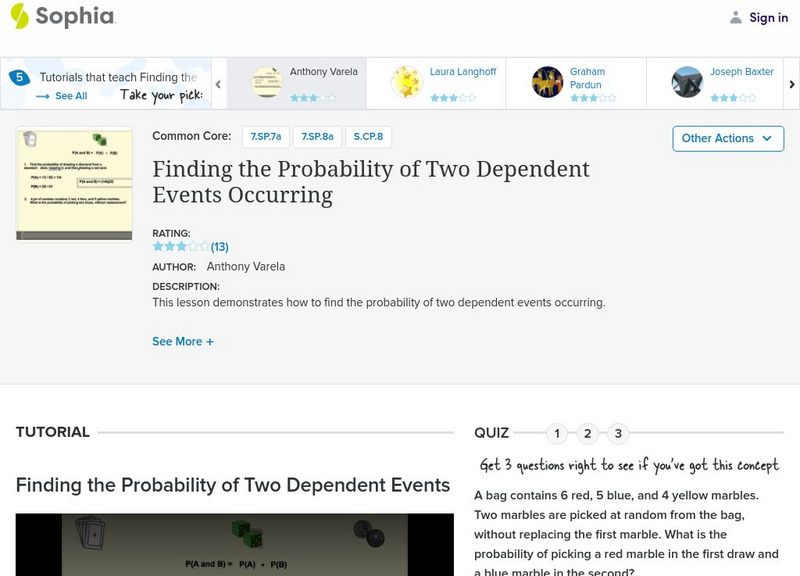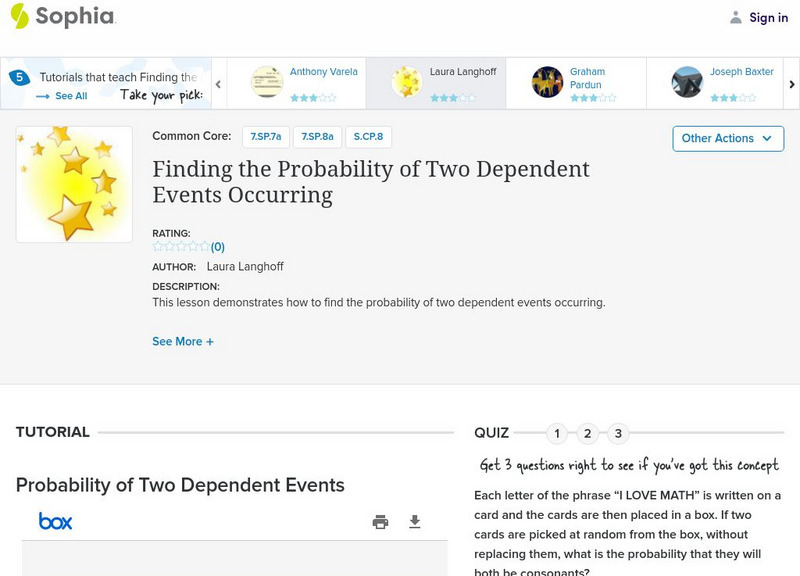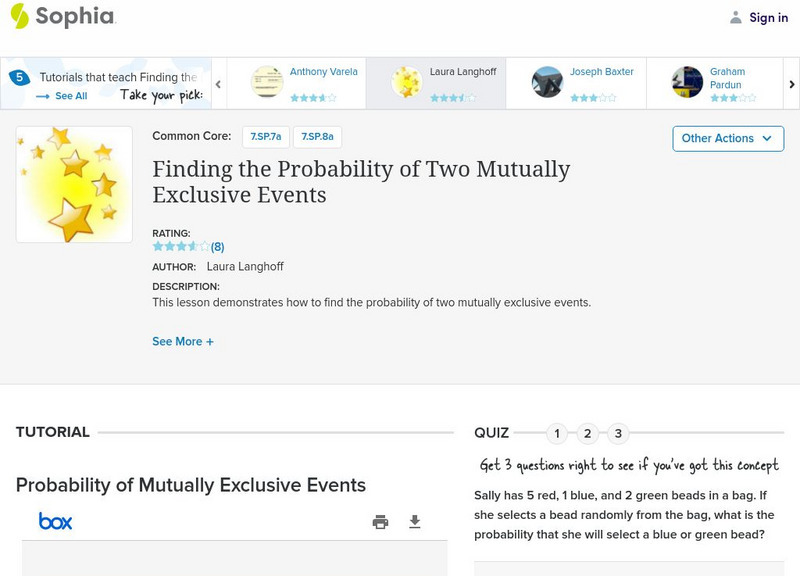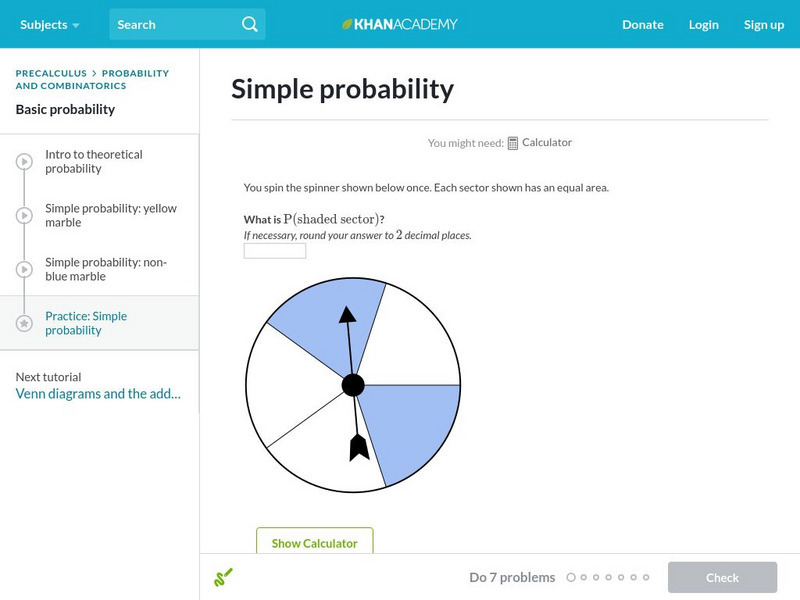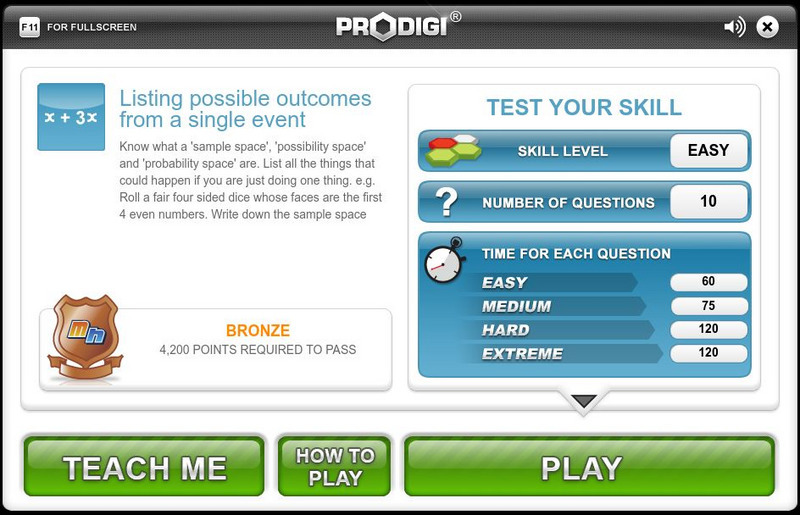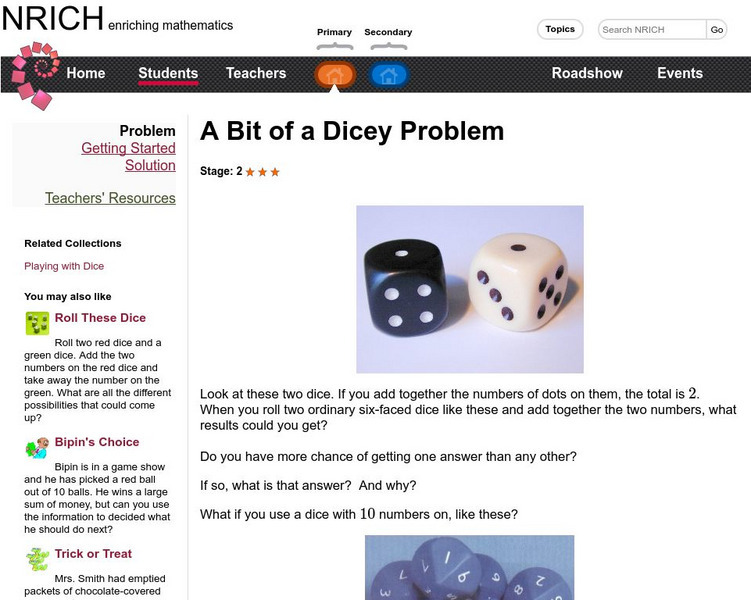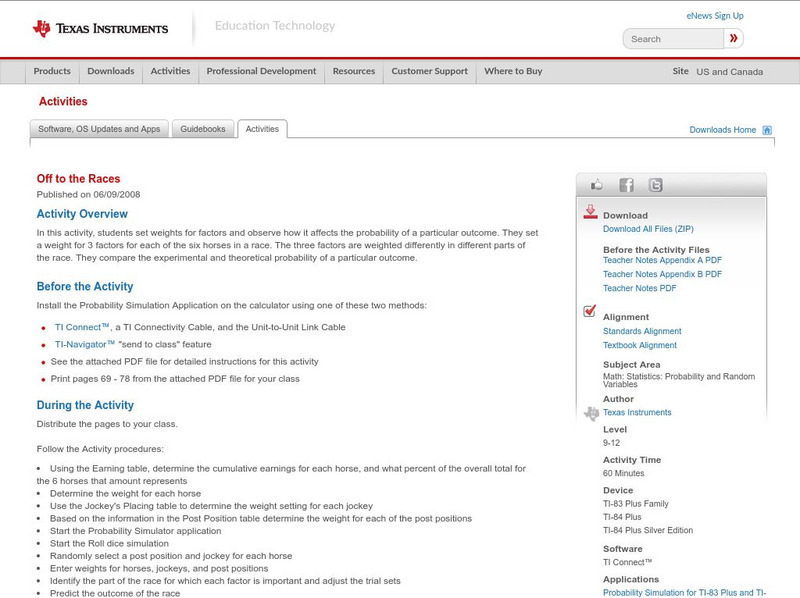Hi, what do you want to do?
McGraw Hill
Glencoe Mathematics: Online Study Tools: Probability of Simple Events
This site gives a short interactive quiz which allows students to self-assess their understanding of the concept of the probability of simple events.
McGraw Hill
Glencoe: Self Check Quizzes 2 Simple Events
Use Glencoe's Math Course 2 randomly generated self-checking quiz to test your knowledge of the probability of outcomes for simple events. Each question has a "Hint" link to help. Choose the correct answer for each problem. At the bottom...
Sophia Learning
Sophia: Finding the Probability of Two Dependent Events Occurring: Lesson 4
This lesson demonstrates how to find the probability of two dependent events occurring. It is 4 of 4 in the series titled "Finding the Probability of Two Dependent Events Occurring."
Sophia Learning
Sophia: Simple Events, Outcomes, and Probability: Lesson 5
This lesson defines terms simple event, outcome, and probability. It is 5 of 5 in the series titled "Simple Events, Outcomes, and Probability."
Sophia Learning
Sophia: Simple Events, Outcomes, and Probability: Lesson 1
This lesson defines terms simple event, outcome, and probability. It is 1 of 5 in the series titled "Simple Events, Outcomes, and Probability."
Sophia Learning
Sophia: Simple Events, Outcomes, and Probability: Lesson 4
This lesson defines terms simple event, outcome, and probability. It is 4 of 5 in the series titled "Simple Events, Outcomes, and Probability."
Sophia Learning
Sophia: Finding the Probability of Two Dependent Events
This lesson demonstrates how to find the probability of two dependent events occurring.
Sophia Learning
Sophia: Finding the Probability of Two Dependent Events Occurring: Lesson 1
This lesson demonstrates how to find the probability of two dependent events occurring. It is 1 of 4 in the series titled "Finding the Probability of Two Dependent Events Occurring."
Texas Instruments
Texas Instruments: You're Probably Right, It's Wrong
In this activity, students perform a simulation to guess answers on a test and determine the experimental probability of passing the test. They then compare it with the theoretical probability.
McGraw Hill
Glencoe: Self Check Quizzes: Theoretical Probability
Use Glencoe's randomly generated self-checking quiz to test your knowledge of theoretical probability. Each question has a "Hint" link to help. Choose the correct answer for each problem. At the bottom of the page click the "Check It"...
Sophia Learning
Sophia: Finding the Probability of Two Mutually Exclusive Events
This lesson demonstrates how to find the probability of two mutually exclusive events.
Khan Academy
Khan Academy: Simple Probability
Practice finding probabilities of events, such as rolling dice, drawing marbles out of a bag, and spinning spinners. Students receive immediate feedback and have the opportunity to try questions repeatedly, watch a video or receive hints.
Scholastic
Scholastic: Study Jams! Math: Probability: Find Probability
This site provides great practice on the concept of probability. Students can first learn about the topic by watching a step by step instruction video that also points out areas of concern. Finally, students can practice their knowledge...
Khan Academy
Khan Academy: Theoretical and Experimental Probability: Coin Flips and Die Rolls
A set of questions on experimental and theoretical probabilities using coins and dice. Answers are accompanied by explanations.
Oswego City School District
Regents Exam Prep Center: Mutually Exclusive & Independent Events
The somewhat tricky differences between mutually exclusive, non-mutually exclusive, independent, and dependent events are defined here. Common items such as coins, colored cubes, and a deck of cards are all part of the easy-to-understand...
Mangahigh
Mangahigh: Data: Listing Possible Outcomes From a Single Event
Students learn about the concept of outcomes by exploring a tutorial. They can then test their knowledge by taking a ten question assessment that increases in difficulty as they correctly answer questions.
University of Cambridge
University of Cambridge: Nrich: A Bit of a Dicey Problem
Short website offers a look into the theoretical probability of tossing dice. Several questions related to the throwing of dice are included.
Texas Instruments
Texas Instruments: Off to the Races
In this activity, students set weights for factors and observe how it affects the probability of a particular outcome. They set a weight for 3 factors for each of the six horses in a race. The three factors are weighted differently in...
ClassFlow
Class Flow: Probability Starter: Handling Data
[Free Registration/Login Required] Students are introduced to the concept of theoretical and actual probability in a variety of contexts.
University of Cambridge
University of Cambridge: Nrich: In a Box
This probability problem encourages the learner not only to arrive at a solution, but also to defend it.
Texas Instruments
Texas Instruments: Analyzing Number Cube Sums
In this activity, students extend their understanding of theoretical probability and patterns. They use number cubes, to build awareness that a fraction and its decimal and percent representation on the calculator are "close," but not...
Alabama Learning Exchange
Alex: Puzzling Pangaea
In this lesson plan students will work collaboratively to research information in order to prove or disprove if a super continent ever existed. Students will create a model of Pangaea to show how their research findings 'connect' in a...
Sophia Learning
Sophia: Sampling and Prediction: Lesson 3
This lesson demonstrates how sampling can help predict outcomes. It is 3 of 2 in the series titled "Sampling and Prediction."
Sophia Learning
Sophia: Sampling and Prediction: Lesson 1
This lesson demonstrates how sampling can help predict outcomes. It is 1 of 2 in the series titled "Sampling and prediction."







